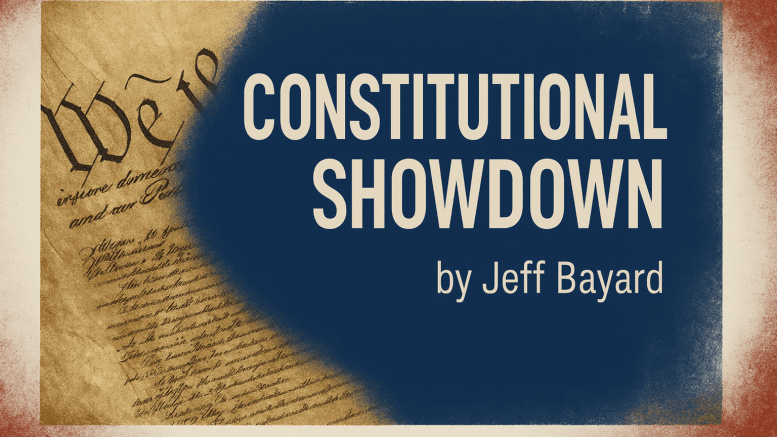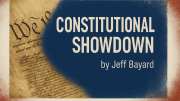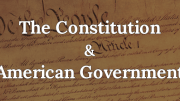Playback speed:
The Virginia Christian Alliance continues our Constitutional Showdown series framed from the Christian Worldview and Constitutional originalism, exposing how modern courts twist the framers’ original intent while equipping believers to defend constitutional truth through faithful citizenship and prayer.
The Supreme Court just agreed to hear Watson v. Republican National Committee, a case that could overturn ballot receipt laws in 31 states plus the District of Columbia. Republicans argue ballots must be received by Election Day. Democrats insist ballots postmarked by Election Day should count for days afterward.
Both sides are arguing over the wrong question.
The real issue isn’t WHEN ballots should arrive. It’s WHO should be voting by mail in the first place—and when we decided that personal convenience trumps constitutional design. Jeff Bayard’s Third Way framework rejects both partisan extremes and pursues constitutional fidelity grounded in biblical principles of justice and personal responsibility.
“The soul of the sluggard craves and gets nothing, while the soul of the diligent is richly supplied.” (Proverbs 13:4)
The Watson v. RNC Case: What’s at Stake
Mississippi law allows mail-in ballots to be counted if received within five business days after Election Day, provided they’re postmarked by Election Day. Thirty other states plus DC have similar laws.
The RNC sued in 2024, arguing this violates federal statutes (2 USC 7 and 3 USC 1) that set “the Tuesday after the first Monday in November” as Election Day. Their position: if Congress set “the day” for elections, ballots must be both cast AND received by that day.
A federal district judge upheld Mississippi’s law. The 5th Circuit reversed, siding with the RNC. Mississippi’s Republican Secretary of State Michael Watson—creating the unusual spectacle of GOP officials on opposite sides—appealed to SCOTUS.
Nineteen states filed briefs supporting Mississippi, warning that the 5th Circuit’s ruling “invites nationwide litigation” and endangers military voters whose ballots take weeks to arrive from combat zones.
The stakes: If the RNC wins, states must immediately change laws and military ballots face mass disqualification. If Mississippi wins, post-Election Day ballot receipt becomes permanently entrenched.
But here’s what neither side addresses: How did we reach the point where nearly two-thirds of states accept ballots arriving after winners should be declared?
The Question Nobody’s Asking: WANT vs. NEED
Election Day isn’t a surprise. It’s set by federal law, announced years in advance. The United States Postal Service delivers 99% of first-class mail within three days. If you mail your ballot two weeks early, it WILL arrive barring catastrophic failure.
Yet 31 states accommodate ballots arriving AFTER Election Day. Why?
Because we’ve confused two fundamentally different concepts:
- NEED-based absentee voting: For citizens who CANNOT vote in person due to circumstances beyond their control.
- WANT-based absentee voting: For citizens who PREFER not to vote in person for reasons of personal convenience.
The Constitution—and 150 years of tradition—recognized only the first. We’ve embraced the second.
The Military Exception Proves the Rule
A soldier in Kandahar cannot control when helicopters evacuate mail from his firebase. His ballot travels through military postal facilities (APO/FPO addresses) operating on combat schedules, not postal schedules. Mail runs happen when operations permit—sometimes weekly, sometimes less. Security delays can add days. His ballot must route through international networks beyond his control.
If his ballot takes three weeks to arrive, that’s genuinely beyond his control.
Now consider a healthy accountant in Jackson, Mississippi. She can request a ballot in September. Complete it in October. Mail it with tracking in late October. Drop it at the election office any weekday. Walk it to a drop box on her lunch break.
If she waits until Election Day to mail her ballot, whose fault is that?
The soldier faces barriers he cannot overcome. The accountant makes choices about her schedule.
This is why the Uniformed and Overseas Citizens Absentee Voting Act (UOCAVA) provides extended deadlines for military voters. It’s not rewarding procrastination—it’s acknowledging genuine barriers beyond the voter’s control.
One deserves accommodation. The other deserves to experience the consequences of poor planning.
Proverbs 21:5 — “The plans of the diligent lead surely to abundance, but everyone who is hasty comes only to poverty.”
“But There Are More People Now” – Why This Fails
Some argue: “The Founders had 4 million people. We have 330 million. We NEED weeks of voting to handle the volume!”
The math destroys this argument.
Population increase: 1800 to 2020 = 66x more people
Infrastructure increase: From scattered rural polling places to 176,933 precincts nationwide = 177,000x more capacity
The ratio improved DRAMATICALLY in our favor.
More devastating evidence:
France: 67 million people vote in ONE DAY, paper ballots hand-counted, results by midnight.
Germany: 83 million people vote in ONE DAY, hand-counted publicly, results same evening.
Canada: 38 million people across the SECOND-LARGEST COUNTRY ON EARTH vote in ONE DAY, hand-counted, results same night.
If they can do it, why can’t we?
We don’t lack capacity. We lack will.
1960: Nearly 70% turnout, nearly all on Election Day, hand-counted results by midnight in most places.
2020: Similar turnout, but votes counted over DAYS because we’ve normalized “I’ll vote when convenient.”
The problem isn’t population. It’s culture. We’ve replaced civic duty with consumer convenience.
How We Lost Election Day
Civil War (1864): Nineteen Union states allow soldiers to vote from battlefields. Pure necessity—these men are in combat. Absentee voting emerges as exception for those who CANNOT vote in person.
Early expansion (1896-1980s): Vermont pioneers civilian absentee in 1896, requiring documented excuse (illness, necessary absence). By 1980s, California introduces “no-excuse” absentee—anyone can request a ballot for any reason.
COVID catastrophe (2020): Emergency orders transform elections. Twenty-nine states enact 79 bills expanding mail voting. Automatic mail-outs to all voters. Drop boxes proliferate. Witness requirements suspended. Result: 43% vote by mail—double the 2016 rate.
Post-COVID divide: Some states made changes permanent. Others rolled back. But 31 states now accept ballots days after Election Day—accommodating not just military voters with genuine delays, but procrastinating civilians who mailed ballots at the last minute.
The pattern: Exception → Convenience → Universal alternative → Constitutional crisis.
The Constitutional Standard: Election DAY, Not Election SEASON
Article I, Section 4 gives states authority over election “Times, Places and Manner” but allows Congress to override.
Federal law (2 USC 7, 3 USC 1) sets “the Tuesday after the first Monday in November” as Election Day.
Notice: “THE DAY”—singular. Not “the voting period.” Not “the election season.” THE DAY.
The Framers intended simultaneity. When the nation votes on one day, the collective will is clear. When votes trickle in over weeks, that clarity dissolves. Early voters lack information available to later voters. October surprises arrive too late. Ballot harvesting operations have weeks to operate. Prolonged counting creates prolonged uncertainty and litigation.
Ecclesiastes 5:2 — “Be not rash with your mouth, nor let your heart be hasty to utter a word before God, for God is in heaven and you are on earth. Therefore let your words be few.”
The Constitution set ONE day for the nation to speak. Extending it to weeks dilutes the voice and invites manipulation.
The Deeper Question Watson Doesn’t Address
Watson v. RNC asks WHEN ballots must be received. But WHO should vote by mail in the first place?
Twenty-eight states now allow “no-excuse” absentee—anyone can request a ballot for any reason. Five states mail ballots to ALL voters automatically. This isn’t accommodation. It’s transformation of Election DAY into Election SEASON.
Legitimate NEED (Constitutional):
Military/overseas: Combat zones, APO/FPO delays, genuinely cannot control mail timing
Elderly/disabled: Nursing home residents, homebound with verified conditions, genuine physical barriers
Essential workers: Election judges, hospital staff on 12-hour shifts, cannot leave posts during voting hours
Religious observers: Sabbath falls on Election Day, genuine religious prohibition
Emergency travel: Documented family emergency, unforeseeable circumstances
Illegitimate WANT (Convenience):
“I prefer voting from home” — Not a constitutional right
“Lines are too long” — States should fix Election Day operations, not abandon the day
“I’ll be on vacation” — You planned this; plan around civic duty
“It’s more convenient” — Convenience isn’t a constitutional standard
“I want to vote early” — Your preference doesn’t reshape the Constitution
The distinction: Government should accommodate circumstances beyond citizens’ control. It should NOT accommodate poor planning within citizens’ control.
The Third Way: Responsibility Plus Accommodation
The Third WayThird Way rejects both extremes—banning all absentee voting (disenfranchising military voters) and making all voting absentee (destroying Election Day).
Restore “Excuse Required” Standard
States must require a written application with documented reasons, verification (not self-attestation), and enumerated categories only: military, disabled, essential workers, religious observers, and emergency travel. Reject “no-excuse” systems, automatic mail-outs, and “I might be busy” as a valid excuse.
Annual renewal required—no permanent absentee status for convenience voters. False claims = election fraud charges.
Strict Deadlines with Military Exception
For domestic civilians: Ballots must be RECEIVED by Election Day. No extended windows. You have weeks to return your ballot—use that time.
For military/overseas (UOCAVA): Ballots must be CAST (postmarked) by Election Day with 3-5 business day receipt window. This accommodates genuine postal delays beyond voter control.
For all voters: Postmark required. No ballot counted without proof of mailing date. Prevents post-election “finding” of ballots.
Expect Personal Responsibility
Citizens must request ballots early, complete promptly, return with adequate time, and plan ahead rather than creating emergencies. Government must provide clear deadlines and count legally cast ballots—but NOT reward procrastination.
The line: Accommodate circumstances beyond control. Don’t accommodate poor planning within control.
What SCOTUS Should Rule
The Court should distinguish between voter categories:
Domestic civilian voters: Federal law requires ballots RECEIVED by Election Day. States may not extend receipt deadlines for voters who have weeks to return ballots.
Military/overseas voters: Federal law requires ballots CAST (postmarked) by Election Day. States may allow 3-5 business day receipt window for genuine postal delays beyond voter control.
All voters: Postmark proof required. No ballot counted without documentation of mailing date.
This ruling would:
- Honor Election DAY constitutional design
- Protect military from disenfranchisement
- End extended windows for procrastinating civilians
- Require citizen responsibility
- Prevent post-election manipulation
- Maintain chain of custody
What Christians Must Do
Pray for wisdom (James 1:5). Nine justices face enormous pressure over state sovereignty, military voters, and Election Day’s meaning. Only divine wisdom can thread this needle.
Vote in person if you can. The simplest witness: If you CAN vote on Election Day, DO IT. Don’t request an absentee out of convenience. Model responsible citizenship.
Demand legislative action. Contact state legislators: Support “excuse required” standards. Oppose “no-excuse” for all. End automatic mail-outs. Require postmark proof. Restore Election DAY primacy.
Teach your church. Most Christians don’t understand how far we’ve drifted. This isn’t about making voting harder—it’s restoring civic duty of showing up on the day the Constitution designates.
Romans 13:7 — “Pay to all what is owed to them…respect to whom respect is owed, honor to whom honor is owed.”
We owe fellow citizens the respect of taking civic duty seriously. We owe our nation the honor of the collective democratic moment the Founders designed.
Conclusion: Watson Addresses Deadlines, The Third Way Addresses Character
The Supreme Court’s ruling in Watson v. RNC will clarify federal law, affect 31 states, and determine military voter protection. It matters.
But Watson addresses only WHEN ballots arrive. It doesn’t address WHO should vote by mail. It doesn’t distinguish voters who NEED accommodation from those who merely WANT convenience.
The reform we need:
Restore “excuse required” absentee voting. Maintain Election Day as primary method. Expect citizens to plan ahead. Accommodate genuine inability while rejecting mere preference.
A soldier in Kandahar CANNOT vote on Election Day. We owe him extended deadlines and gratitude.
A healthy civilian who prefers voting from the couch CAN vote on Election Day. We owe him the expectation that he will.
The difference between NEED and WANT is the difference between constitutional accommodation and constitutional corruption.
Watson will address deadlines. The Third Way addresses character.
Proverbs 20:4 — “The sluggard does not plow in the autumn; he will seek at harvest and have nothing.”
Citizens who wait until Election Day to mail ballots due Election Day are planting in harvest season. The state shouldn’t manufacture a crop for them.
Has your state eliminated “excuse required” absentee voting? Should healthy civilians receive the same accommodations as deployed soldiers? Share your thoughts below.
For more Constitutional Showdown analysis, see our coverage of proof of citizenship requirements and other election integrity battles.




